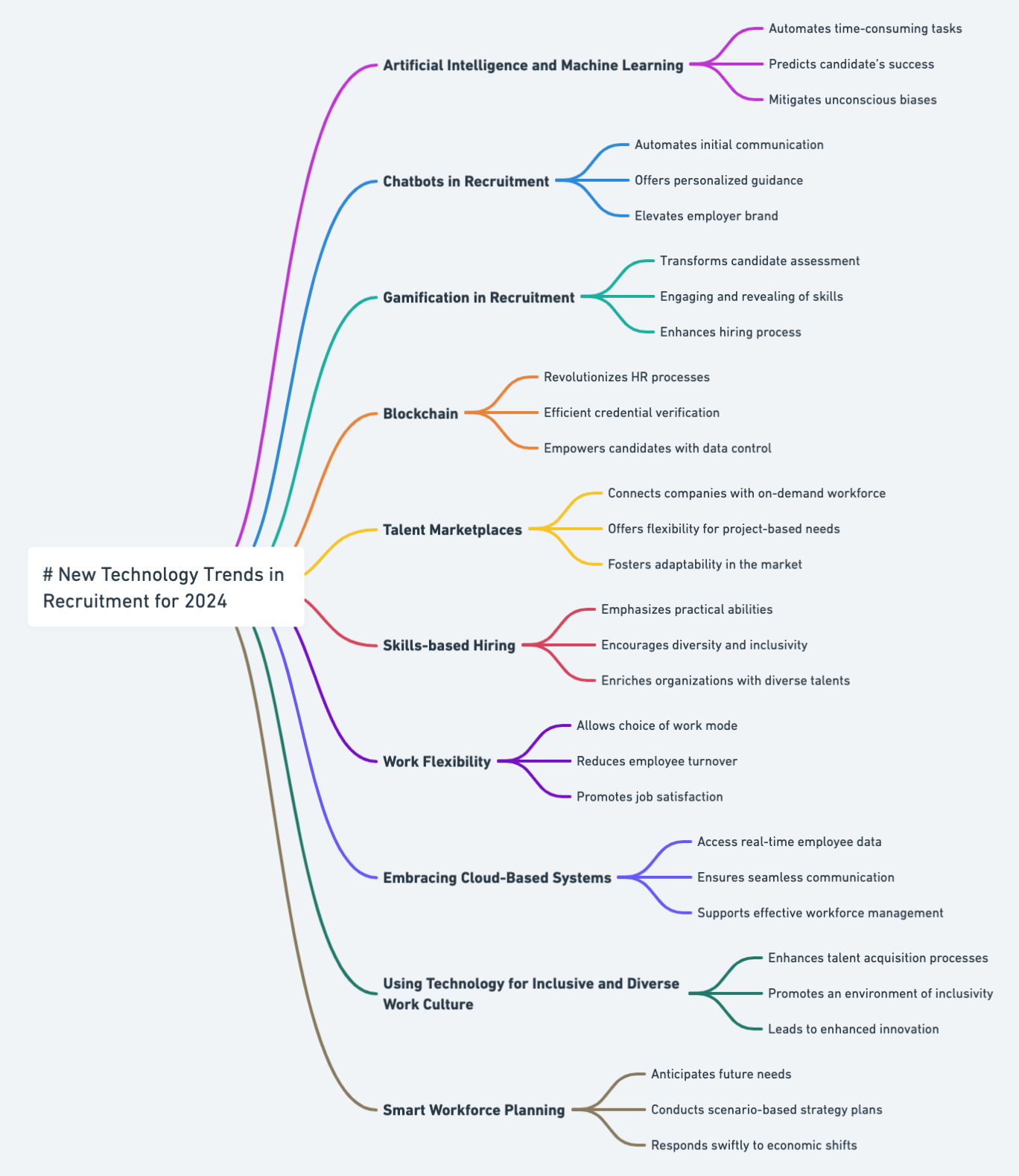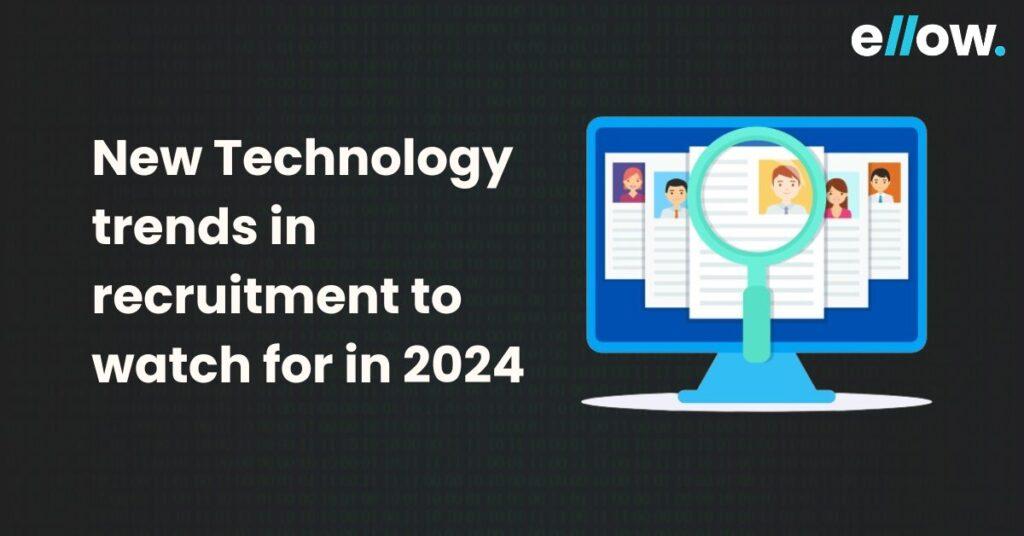In the fast-evolving world of recruitment, some groundbreaking innovations are transforming the hiring landscape. According to HR Technologist’s recent findings, artificial intelligence (AI) is forecasted to play a pivotal role, slashing hiring costs by a remarkable 60% and reducing time-to-fill by an impressive 70%. These statistics underscore the efficiency gains that organizations can expect from AI-driven recruitment tools.
A notable development on the horizon is the widespread integration of virtual reality assessments into the hiring process. This trend is gaining momentum, promising a more holistic evaluation of candidates.
As we go into this blog, we will look into the top 10 recruitment technology trends for 2024, offering insights into how these advancements will reshape the strategies employed by HR professionals to attract, select, and retain top-tier talent. Stay tuned to discover the exciting possibilities that lie ahead in the world of recruitment.
New Technology trends in recruitment to watch for in 2024

1. Artificial Intelligence and Machine Learning
Artificial Intelligence (AI) and Machine Learning (ML) are revolutionizing recruitment in 2024. These technologies automate time-consuming tasks like resume screening, allowing HR professionals to focus on strategic aspects.
This automation extends beyond mere efficiency; it introduces sophisticated analytics for predicting a candidate’s job performance and cultural fit, thereby enhancing the quality of hire.
AI and ML enhance decision-making by analyzing vast data, predicting a candidate’s success within an organization. The integration of these technologies goes further to mitigate unconscious biases, promoting a fairer and more inclusive hiring process by focusing on skills and competencies rather than subjective evaluations and minimizing the risk of poor hires.
2. Chatbots in Recruitment
Chatbots, leveraging advanced conversational AI, are becoming integral to the recruitment ecosystem. They are not only automating initial communication with candidates, such as scheduling interviews and answering FAQs but also evolving to offer personalized guidance through the application process.
These AI-driven assistants are increasingly capable of delivering more nuanced interactions, reflecting the employer’s brand voice and values, thereby enriching the candidate experience. The strategic deployment of chatbots can significantly elevate the employer brand, making companies more attractive to prospective employees.
3. Gamification in Recruitment
Gamification in recruitment is transforming the candidate assessment process by embedding game-like elements that are both engaging and revealing of candidates’ skills.
This trend redefines talent assessment by presenting candidates with engaging scenarios and challenges, offering a more authentic evaluation of their skills and problem-solving abilities. Unlike traditional assessments, gamification creates an enjoyable experience, encouraging candidates to showcase their true potential.
This approach not only enhances the hiring process but also provides candidates with a realistic preview of the job role and company culture. By making assessments dynamic and interactive, gamification contributes to a more diverse pool of applicants, reinforcing an employer’s brand as innovative and employee-focused.
4. Blockchain
Blockchain integration in talent acquisition is gaining traction as a game-changer. Beyond its common applications in Supply Chain and Finance, blockchain, combined with AI and automation, is set to revolutionize Human Resources (HR).
Beyond credential verification, blockchain offers a decentralized platform for storing professional achievements and skills, making the verification process more efficient for employers and empowering candidates with control over their professional data.
According to an IBM study, blockchain’s impact on HR is anticipated to be significant.
By providing a secure and transparent platform, it enables companies to perform audits, manage data efficiently, and streamline various administrative tasks.
This innovative use of blockchain technology enhances the overall integrity and efficiency of talent acquisition processes, marking a transformative trend in HR.
5. Talent Marketplaces
Talent marketplaces are becoming central to how businesses access specialized skills swiftly just like ellow.io. Acting as intermediaries, these platforms connect companies with an on-demand workforce, offering flexibility for project-based needs.
This trend allows organizations to efficiently scale their workforce up or down based on demand, reducing overhead costs. For workers, especially freelancers, talent marketplaces provide autonomy to choose assignments aligning with their skills.
This trend underscores the strategic use of these platforms to tap into the gig economy, ensuring businesses have access to diverse skills, fostering adaptability in an ever-changing market, and positioning them ahead in the competition for top talent.
6. Skills-based Hiring
Skills-based hiring is a transformative trend in recruitment, emphasizing practical abilities over traditional qualifications. Instead of relying solely on educational backgrounds or work history, this approach assesses candidates through a competency framework, including online skills assessments, coding challenges, and competency-based interviews.
Technology plays a crucial role, in providing innovative solutions to evaluate a candidate’s real-world capabilities objectively.
Skills-based hiring practices encourage diversity and inclusivity by leveling the playing field for candidates from varied educational and professional backgrounds.
This paradigm shift enriches organizations with diverse talents, contributing to a more dynamic and productive workforce.
7. Work Flexibility
Organizations are prioritizing work flexibility, allowing employees to choose where, when, and how they work. This shift from rigid office-centric practices to a more human-centric model is aimed at reducing employee turnover.
According to Gartner, 52% of employees emphasize the importance of flexible working policies in their decision to stay with a company.
To successfully implement flexibility, employers need to make it the default rather than the exception, focusing on principles rather than strict policies. This approach empowers employees, promoting job satisfaction, and positively impacting organizational retention rates in a changing work landscape.
8. Embracing Cloud-Based Systems
Cloud-based systems, like Human Capital Management (HCM) solutions, have become indispensable for HR in 2024. These systems, powered by cloud technology, allow HR professionals to access real-time employee data from any location.
Whether employees are in the office or working remotely, cloud-based systems keep them connected, ensuring seamless communication and efficient decision-making.
Adopting these systems aligns with technological advancements, enabling HR to stay agile and responsive in a rapidly evolving work environment. In essence, cloud-based systems facilitate the accessibility of crucial HR information, supporting effective workforce management in the modern era.
9. Using Technology for Inclusive and Diverse Work Culture
In 2024, fostering an inclusive and diverse workplace culture is a priority for organizations. Companies are increasingly turning to technology, specifically Diverse and Inclusive (D&I) technologies, to enhance talent acquisition, sourcing, and selection processes. This tech-driven approach aims to create workplaces where diversity is not only acknowledged but actively integrated, contributing to better financial outcomes.
Embracing D&I technologies allows companies to attract a broader range of talents and promotes an environment where employees from diverse backgrounds feel valued. This emphasis on inclusivity aligns with a growing recognition that diverse teams lead to enhanced innovation and overall business success.
10. Smart Workforce Planning
In the ever-changing economic landscape of 2024, Smart Workforce Planning is crucial. Talent managers must strategically anticipate future needs, using AI to predict suitable roles, skills, and geographical demands. The hiring landscape is evolving, and businesses need to adapt. To navigate uncertainties, professionals are advised to conduct scenario-based workforce strategy plans and thorough risk assessments.
This proactive approach ensures that companies can respond swiftly to economic shifts, whether facing crises or planning for rapid recovery, reinforcing the importance of dynamic and forward-thinking talent acquisition strategies in the face of potential recessions or disruptions in the industry.
Conclusion
Keeping up with the latest trends in HR technology is crucial in today’s ever-changing world of Human Resources. As we move forward in a future shaped by constant innovation and automation, it is vital to embrace cutting-edge HR technologies.
By incorporating these advancements into our HR practices, we not only enhance efficiency but also establish a solid groundwork for a workplace that is prepared for the future. The insights shared about HR tech trends in 2024 aim to offer valuable perspectives for creating a forward-looking and adaptive workplace. Embracing these technological shifts ensures that our organizations stay competitive and resilient in the evolving landscape of Human Resources.
Check this video out: Top Future Tech Trends to Watch in 2024
FAQs
-
What are some key technology trends in recruitment for 2024?
The article discusses various cutting-edge technologies shaping recruitment in 2024, providing insights into emerging trends.
-
How can organizations leverage new technologies for improved recruitment processes?
The article outlines ways organizations can harness the power of new technologies to enhance their recruitment strategies and streamline processes.
-
Are there specific tools mentioned in the article that recruiters should be aware of in 2024?
Yes, the article highlights specific tools and technologies that recruiters should keep an eye on in 2024, offering a glimpse into the future of recruitment.
-
Why is staying updated on technology trends crucial for HR professionals and recruiters?
The article emphasizes the importance of staying abreast of technology trends to remain competitive, efficient, and relevant in the ever-evolving field of recruitment.
-
How do the discussed technology trends contribute to building a more innovative and adaptive recruitment process?
The article explores how the highlighted technology trends play a pivotal role in fostering innovation and adaptability within the recruitment process, ensuring organizations stay ahead in the dynamic landscape of talent acquisition.









